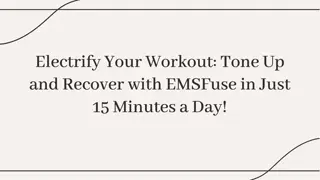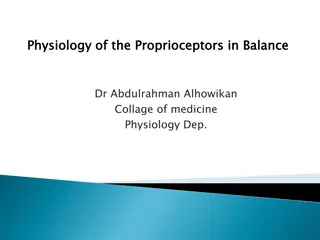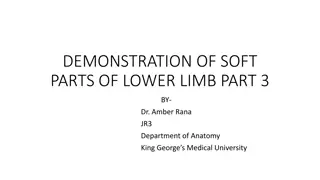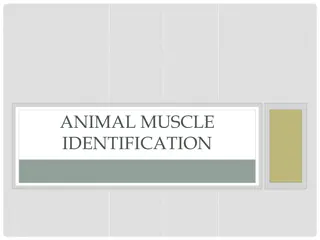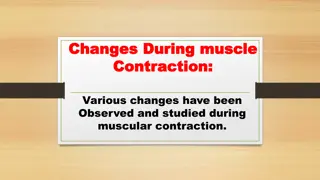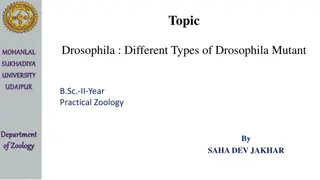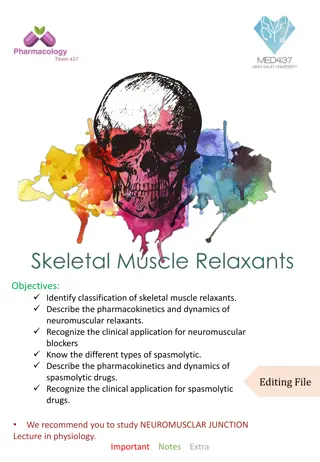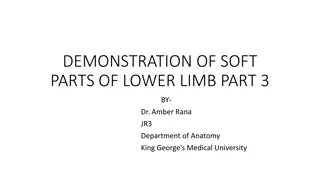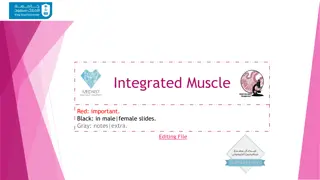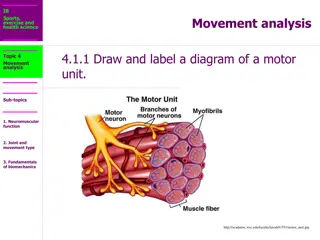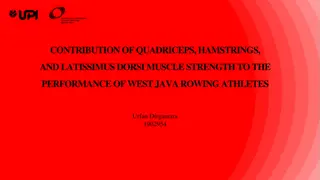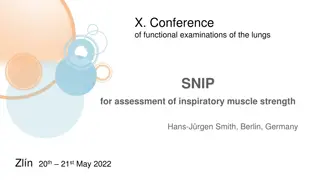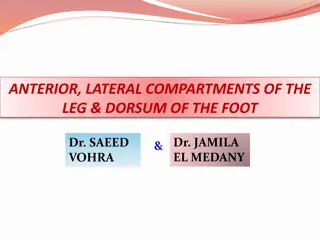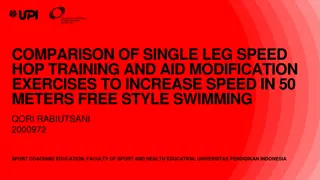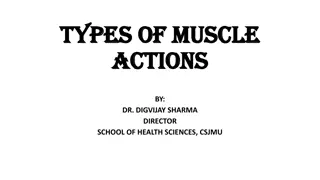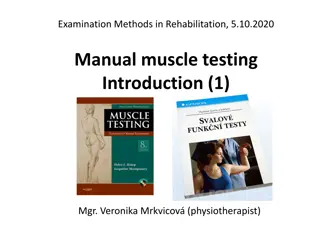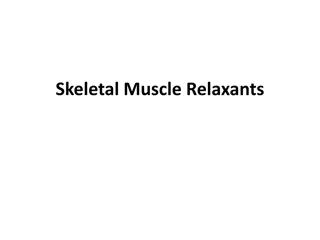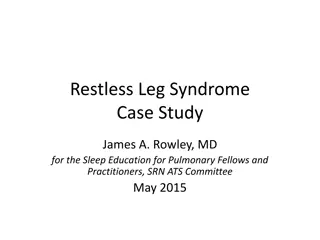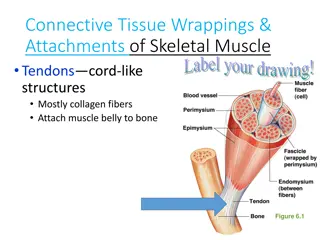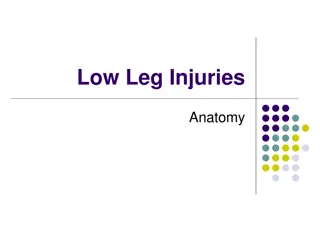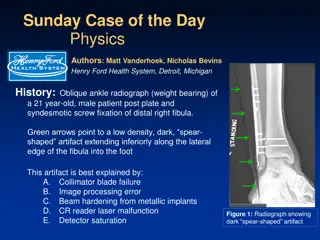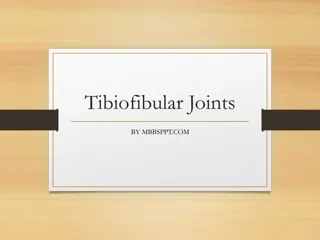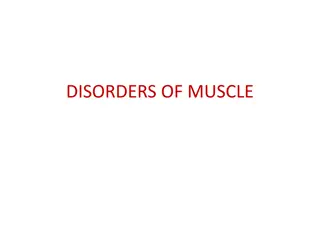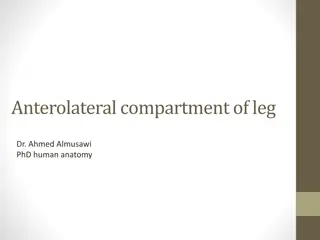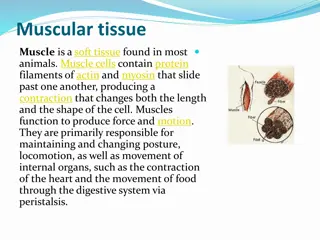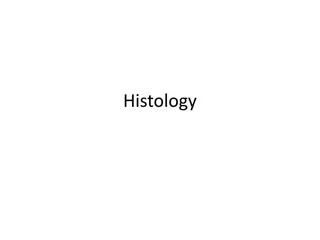270 Leg free Awning
Enhance your camping space with a 270 Leg Free Awning. Explore versatile and practical awning solutions for your outdoor setup at Ccamp.com.au.
6 views • 1 slides
The muscular system
The muscular system is a vital organ system that includes smooth, skeletal, and cardiac muscles. It plays a crucial role in locomotion, supporting the cardiovascular system, enabling lung ventilation, regulating fluids, maintaining posture, and generating heat in the body. This system consists of ar
2 views • 16 slides
Understanding the Anterior Compartment of Leg and Foot Anatomy
Explore the anatomy of the anterior compartment of the leg and foot, focusing on structures like the anterior tibial artery, deep peroneal nerve, and dorsalis pedis artery. Learn about their origin, course, relations, and branches, as well as conditions like foot drop and fresher's syndrome. The pre
6 views • 17 slides
Skeletal Muscle Relaxants and Neuromuscular Blockade
Skeletal muscle relaxants are used to induce muscle relaxation during surgeries. Neuromuscular blocking agents act at the neuromuscular junction. These drugs can either peripherally reduce muscle tone or centrally cause muscle paralysis. Different types of muscle relaxants are classified based on th
6 views • 23 slides
Do Leg Warmers Keep Your Feet Warm_
Discover if leg warmers truly keep your feet warm. Learn about their effectiveness and find out how to stay cozy in chilly weather.
7 views • 4 slides
Unveiling the Best Mass Gainers in India for Maximum Muscle Growth
Discover the ultimate solution for achieving your muscle-building goals with the best mass gainers available in India. Our comprehensive guide delves into the top-rated products designed to support your mass gain journey effectively. Whether you're a beginner or a seasoned fitness enthusiast, these
6 views • 1 slides
Boost Muscle Tone and Recovery with EMSFuse in Just 15 Minutes a Day!
Experience Enhanced Muscle Toning with EMSFuse: Revolutionize your fitness routine with EMSFuse, the cutting-edge solution for muscle toning and recovery. Harness the benefits of EMS to build stronger muscles, alleviate pain, and speed up healing. Achieve optimal fitness results in just 15 minutes d
1 views • 8 slides
Understanding Proprioceptors and Their Role in Body Balance
Proprioceptors play a crucial role in providing information about the position of body parts, muscle spindle response to stretch, and muscle tension regulation. Muscle spindles and Golgi tendon organs are key components in maintaining muscle tone and ensuring proper reflex actions. This article delv
1 views • 23 slides
Demonstration of Soft Parts of Lower Limb - Part 3 by Dr. Amber Rana at King George's Medical University
This presentation outlines the structures of the lateral compartment of the leg, posterior compartment of the leg, and dorsum of the foot. It includes information on boundaries, muscles, nerves, and vessels in each region, along with detailed descriptions of specific structures such as the peroneus
0 views • 15 slides
Animal Muscle Identification and Anatomy Diagrams
This collection includes detailed diagrams showcasing the identification and anatomy of muscles in animals, specifically focusing on pig muscle anatomy. From head and neck muscles to arm and shoulder muscles, pelvis and thigh muscles, and trunk muscles, these visual aids help understand the structur
3 views • 26 slides
Muscle Contraction Phases and Responses: A Comprehensive Overview
Various changes observed during muscle contraction include the latent period, contraction phase, and relaxation phase. Muscle twitch, tetanus, and their durations are important phenomena in understanding muscle physiology.
0 views • 14 slides
Exploring Different Types of Drosophila Mutants at Mohanlal Sukhadiya University
Discover the various Drosophila mutants, including Yellow Type, Ebony, Orange-eye, White Eye, Eyes Absent, Leg-headed, and Curly Wings, with unique genetic characteristics and visible phenotypes. This practical Zoology insight provides an in-depth look into mutations affecting body color, eye pigmen
0 views • 11 slides
Skeletal Muscle Relaxants: Classification, Pharmacokinetics, and Clinical Applications
Skeletal muscle relaxants encompass different types, including neuromuscular blockers, spasmolytic drugs, and peripherally-acting agents. They are classified based on mechanisms of action and play crucial roles in inducing skeletal muscle relaxation for various clinical applications. Understanding t
3 views • 12 slides
Demonstration of Lower Limb Soft Tissues - Part 3
This detailed demonstration by Dr. Amber Rana from King George's Medical University focuses on identifying and describing the structures of the lateral compartment of the leg, posterior compartment of the leg, and dorsum of the foot. It covers boundaries, muscles, nerves, and vessels present in each
0 views • 15 slides
Understanding Electromyography (EMG) and Motor Neurons
Electromyography (EMG) is an electrodiagnostic technique used to evaluate muscle health by measuring electrical activity. EMG measures muscle response to nerve signals, displayed as waves on an oscilloscope. Motor neurons transmit signals from the brain to muscles, enabling movement. Upper motor neu
2 views • 8 slides
Understanding the Histological Structure of Muscle Cells
This presentation delves into the histological structure of three types of muscle cells - skeletal, cardiac, and smooth muscles. Learn about their differences, such as striation, voluntary vs. involuntary control, and cellular organization. Discover the components of muscular tissue, the coverings o
0 views • 13 slides
Understanding Motor Units and Neurotransmitters in Muscle Contraction
Motor units consist of a motor neuron and the muscle fibers it innervates. Neurotransmitters like acetylcholine play a vital role in stimulating muscle contraction by transmitting signals at the neuromuscular junction. This communication between neurons and muscles is essential for proper movement a
0 views • 30 slides
Understanding Horse Face and Leg Markings
Learn about different markings found on a horse's face and legs, such as snip, star, strip, blaze, bald face, ermine, combinations, and coronet. These unique patterns create individuality in horses and can range from small spots to large white areas covering the face or leg. They can be symmetrical
0 views • 13 slides
Impact of Plyometric Jump Training on Leg Muscle Power in Badminton Athletes
Plyometric jump to box and double leg hop training can significantly improve leg muscle power in badminton athletes, enhancing their ability to execute powerful smashes. This study focuses on the effects of specific plyometric exercises on leg strength essential for optimal badminton performance. Th
0 views • 9 slides
Contribution of Quadriceps, Hamstrings, and Latissimus Dorsi Muscle Strength to Rowing Performance in West Java
Rowing is a demanding sport that requires strong leg muscle strength for optimal performance, particularly in West Java where rowing athletes train. This study aims to investigate the contribution of quadriceps, hamstrings, and latissimus dorsi muscle strength to the performance of rowing athletes i
0 views • 16 slides
Understanding Spasticity and Increased Muscle Tone in Neurological Disorders
Spasticity and increased muscle tone are common features in neurological disorders, characterized by hyperactive stretch reflexes and muscle contractions. Spasticity is velocity-dependent and associated with upper motor neuron lesions, leading to increased resistance to passive movement. Rigidity, o
0 views • 28 slides
Sniff Nasal Inspiratory Pressure (SNIP): Assessing Respiratory Muscle Strength
SNIP is a sensitive non-invasive test that measures inspiratory muscle strength by assessing nasal pressures during a sniff maneuver. It is a valuable tool for early detection of respiratory muscle decline, providing insights into potential threats like hypercapnic respiratory failure, impaired coug
0 views • 11 slides
Fascial Compartments and Anatomy of Leg and Foot
Understanding the fascial compartments and anatomy of the leg and foot is essential for medical students. This lecture by Dr. Jamila El Medany and Dr. Saeed Vohra covers the deep fascia of the leg, fascial compartments, muscles, blood supply, and nerve supply of the anterior compartment, as well as
0 views • 19 slides
Comparison of Single Leg Speed Hop Training and Aid Modification Exercises for Improving Speed in 50m Freestyle Swimming
This study examines the impact of single leg speed hop training and modified aid exercises on enhancing speed in 50m freestyle swimming. The research involves two groups undergoing specific training methods over 12 sessions within a week. Results discuss the descriptive statistics, normality test, h
0 views • 7 slides
Understanding Types of Muscle Actions in Physiology
Explore different types of muscle actions, including isometric contractions, isotonic contractions, concentric contractions, eccentric contractions, isokinetic contractions, and iso-inertial contractions. Each type plays a crucial role in muscle function and movement, with varying effects on muscle
0 views • 14 slides
Importance of Manual Muscle Testing in Rehabilitation
The assessment of muscle function is crucial in various medical exams, showing correlations with quality of life, work productivity, and aging-related issues. Manual muscle testing is commonly used by healthcare professionals to evaluate muscle strength and guide treatment plans. Assessing muscle fu
0 views • 54 slides
Overview of Common Sleep Disorders and Their Classification
Sleep disorders such as insomnia, restless leg syndrome, obstructive sleep apnea, parasomnias, and narcolepsy are prevalent conditions that affect the quality and pattern of sleep. Insomnia is characterized by difficulty initiating or maintaining sleep and is more common in females and older individ
0 views • 33 slides
Understanding Skeletal Muscle Relaxants and Muscle Contraction Mechanisms
Skeletal muscle relaxants play a crucial role in relaxing muscles without affecting consciousness significantly. They are classified into neuromuscular blockers and spasmolytics, each targeting different mechanisms in the body. Muscle contraction occurs through the release of acetylcholine and the s
0 views • 27 slides
Restless Leg Syndrome Case Study: Diagnosis and Management
Explore a detailed case presentation and diagnostic testing for Restless Leg Syndrome (RLS). Learn about the patient's symptoms, history, differential diagnosis, and recommended medications and tests.
0 views • 13 slides
Understanding Leadership and Power Dynamics
Power and leadership are interconnected concepts, with power being the measure of a person's ability to influence others. Leaders have power in various situations, but it does not necessarily mean having power over people. Effective leaders balance their use of power with knowledge and trust, knowin
0 views • 9 slides
Understanding Connective Tissue Wrappings and Skeletal Muscle Structure
Exploring the connective tissue wrappings and attachments of skeletal muscles, this content highlights the cord-like structures, collagen fibers, and their role in connecting muscle bellies to bones. It also delves into the surrounding connective tissues such as fascia, epimysium, perimysium, and en
0 views • 11 slides
Understanding Low Leg Injuries and Anatomy
Explore the anatomy of the lower leg, focusing on common injuries like shin splints. Learn about muscles, bones, and bony landmarks involved in conditions such as medial tibial stress syndrome. Discover the causes, symptoms, and treatments for these issues.
0 views • 10 slides
Understanding Image Processing Artifacts in Radiography
An oblique ankle radiograph of a patient showed a dark spear-shaped artifact extending from the leg to the foot, which was identified as an image processing error due to a black border imaging algorithm issue. The presence of metal in the leg caused the algorithm to fail, resulting in the artifact.
0 views • 4 slides
Understanding Genu Varum (Bow Leg Deformity) and Its Management
Genu varum, or bow leg deformity, is characterized by lateral angulation of the tibia in relation to the knee, leading to a widened stance. Causes include early weight bearing, conditions like Blount's disease and rickets, and osteoarthritis in adults. Treatment options range from special shoes and
0 views • 6 slides
Understanding Tibiofibular Joints in Leg Anatomy
Tibiofibular joints are crucial for leg stability and weight-bearing. The proximal and distal joints between the tibia and fibula allow minimal movement but provide essential support. The articulating surfaces, supporting structures, and neurovascular supply of both joints play key roles in leg func
0 views • 21 slides
Overview of Muscle Disorders and Muscular Dystrophies
The human body consists of over 600 muscles, divided into skeletal, smooth, and cardiac muscles. Diseases of skeletal muscle encompass myopathy, myositis, and muscular dystrophy. Muscle disorders are categorized into genetic muscular dystrophies, channelopathies, inflammatory myopathies, and endocri
0 views • 32 slides
Overview of Leg Compartments and Nerve Supply in Human Anatomy
This informative content provides detailed insights into the anterolateral compartment of the leg, facial compartments, muscles in the lateral compartment, nerve supply, anterior compartment of the leg, blood, and nerve supply, deep fibular nerve distribution, dorsum and dorsalis pedis artery. It di
0 views • 10 slides
Understanding Muscle Tissue: Structure and Function
Muscle tissue is a vital component in most animals, facilitating movement and maintaining posture. Derived from embryonic cells, muscles come in three types: skeletal, cardiac, and smooth, each serving specific functions in the body. While skeletal muscles are under voluntary control, cardiac and sm
0 views • 15 slides
Understanding Basic Histology and Tissue Types
Explore histology, tissues, and types of tissues including epithelial, connective, muscle, and nerve tissues. Learn about tissue characteristics, differences, and functions, as well as details on specific tissue types like cardiac muscle, bone tissue, skeletal muscle, and smooth muscle. Delve into e
0 views • 74 slides
Muscular System Jeopardy - Learn About Muscle Functions and Facts
Explore the Muscular System Jeopardy game to understand how muscles work, muscle group names, exercises to build muscles, and the importance of healthy muscles. Discover interesting facts about muscle function, including how messages from the brain trigger muscle contractions, the role of tendons in
0 views • 52 slides






